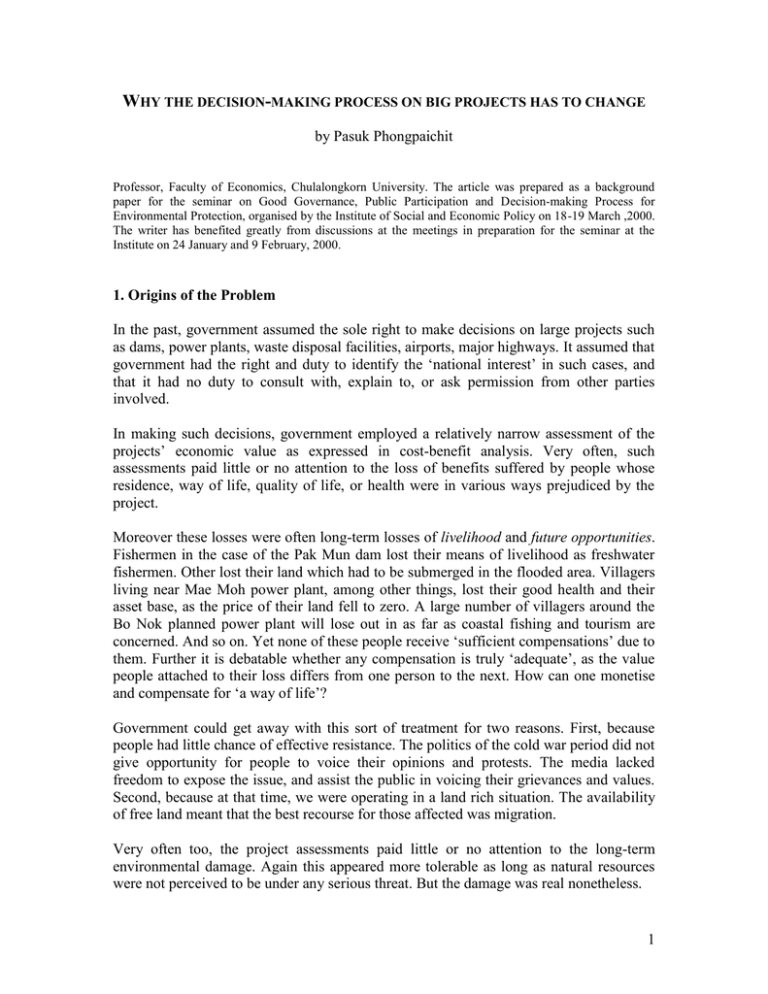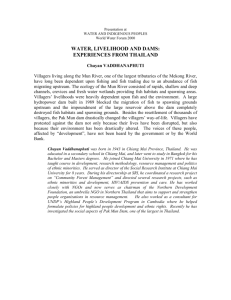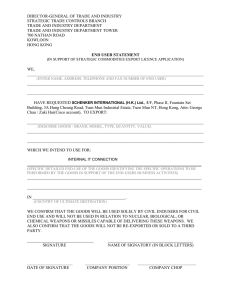W - by Pasuk Phongpaichit
advertisement

WHY THE DECISION-MAKING PROCESS ON BIG PROJECTS HAS TO CHANGE by Pasuk Phongpaichit Professor, Faculty of Economics, Chulalongkorn University. The article was prepared as a background paper for the seminar on Good Governance, Public Participation and Decision-making Process for Environmental Protection, organised by the Institute of Social and Economic Policy on 18-19 March ,2000. The writer has benefited greatly from discussions at the meetings in preparation for the seminar at the Institute on 24 January and 9 February, 2000. 1. Origins of the Problem In the past, government assumed the sole right to make decisions on large projects such as dams, power plants, waste disposal facilities, airports, major highways. It assumed that government had the right and duty to identify the ‘national interest’ in such cases, and that it had no duty to consult with, explain to, or ask permission from other parties involved. In making such decisions, government employed a relatively narrow assessment of the projects’ economic value as expressed in cost-benefit analysis. Very often, such assessments paid little or no attention to the loss of benefits suffered by people whose residence, way of life, quality of life, or health were in various ways prejudiced by the project. Moreover these losses were often long-term losses of livelihood and future opportunities. Fishermen in the case of the Pak Mun dam lost their means of livelihood as freshwater fishermen. Other lost their land which had to be submerged in the flooded area. Villagers living near Mae Moh power plant, among other things, lost their good health and their asset base, as the price of their land fell to zero. A large number of villagers around the Bo Nok planned power plant will lose out in as far as coastal fishing and tourism are concerned. And so on. Yet none of these people receive ‘sufficient compensations’ due to them. Further it is debatable whether any compensation is truly ‘adequate’, as the value people attached to their loss differs from one person to the next. How can one monetise and compensate for ‘a way of life’? Government could get away with this sort of treatment for two reasons. First, because people had little chance of effective resistance. The politics of the cold war period did not give opportunity for people to voice their opinions and protests. The media lacked freedom to expose the issue, and assist the public in voicing their grievances and values. Second, because at that time, we were operating in a land rich situation. The availability of free land meant that the best recourse for those affected was migration. Very often too, the project assessments paid little or no attention to the long-term environmental damage. Again this appeared more tolerable as long as natural resources were not perceived to be under any serious threat. But the damage was real nonetheless. 1 Moreover the environmental impact might extend far beyond the immediate area of the project and the people immediately involved. For example, I as a member of the public feel the loss of over 50 rapids in the Mun river after the Pak Mun dam was built, even though I am not living near the area. I am sure many other people feel the same. The loss of one of Thailand’s largest freshwater fisheries, a virtually free gift of protein from nature, is a permanent loss to society which will be very difficult (or very costly) to repair. Like all non-transparent decision-making processes, this one fostered abuse. Private companies which supplied the inputs in terms of capital equipment, consultancy and raw materials lobbied for go-ahead decisions by the different departments in various ministries, sometimes offering bribes and commission fees to the officials and politicians concerned. Estimates were padded. Contractors paid backhanders to secure the assignment. Substandard materials were used. Fortunes were made on land speculation. Moreover, over time such abuses tended to become public, as rivals for the corruption traded counter-allegations. These practices gave rise to the feeling that the use and management of natural resources are unfair, and devoid of the principles of social justice. Many little people are told to make their personal and community ‘sacrifice’ for the benefits of the ‘nation’. Yet those who directly benefit from the project (shareholders, investors, beneficiaries) are not required to pay the full value for the use of the valuable natural resources, which the ‘nation’ may have to lose forever. Often also the attempts of the losers to express their grievances or their ‘values’, which are deemed to be their natural rights, are not only ignored, but suppressed by various means, judicial and extra-judicial, and sometimes violently. It is this feeling of unfairness and social injustice which is at the core of the conflicts, and which can divide and alienate people from one another. 2. Emergence of the Problem Over the last twenty years there has been a complete change in the opportunities for public expression. This has come about as a result of the collapse of the cold war, the end of military dictatorship, the strengthening of parliament and other representative institutions, and the development of press freedom. At the same time, there has been a general perception that Thailand has changed from a country in which natural resources were abundant to one in which resources are finite, threatened, and fragile. This perception has been formed both by direct local experience, and by increased sharing of information through a global movement of environmental concern. Moreover, the perception of resources under threat has increased as urbanization has accelerated since the early 1980s, and as urban demands for natural resources (land, water) and urban output of pollution (air, noise, water) have vastly accelerated. 2 As one part of this strain on resources, people no longer have the opportunity of migrating away to avoid the impact of a big project on their livelihood, way of life, or quality of life. As a result of the twin trends of resource pressure and political liberalization, more and more people have been moved to protest against big projects in order to defend their own livelihood, way of life, or quality of life. Indeed, for many people still at the periphery of organized formal politics, such impositions on their life have been a major politicizing factor. 3. Failure to Confront the Problem This process has been going on for a long time. The landmark protests against the Nam Choan dam project took place over fifteen years.1 Government has adjusted to these changes. But there is a growing conviction that government has not changed with a full heart and full commitment. Government has accepted the idea of environmental impact studies of projects, and has passed a major legislation designed to protect the environment. But there is a growing feeling that these moves have not prevented completion of big projects which inflict large environmental damage. The controversy over the Pak Mun dam makes this abundantly clear.2 There is also growing evidence that this comes about because environmental impact assessments can be easily abused. Some consultant companies tend to give the project-owner a favourable report because they know this will increase their chance of gaining more commissions in the future. Some simply have too narrow a focus, such as the Pak Mun report which ignored over 50 stretches of rapids which would be flooded with disastrous results for fish breeding. Some are simply careless, such as the Bo Nok report which failed to identify a large coral reef. Besides, the definitions of environmental impact are rapidly changing and becoming more sophisticated. The conventions in current use concentrate very closely on the direct impact of the project. But large projects often have wider impacts whose effect will be felt in the future. Often they destroy environmental resources irrevocably. Often they deny the use of resources to people in the future. Perhaps they contribute in a small but additive way to the loss of biological diversity, the increase in global warming, or some other long-term environmental deterioration on a global scale. Such impacts are not assessed and computed in the cost-benefit analysis. 1 The Nam Choan project in the western forests was abandoned in 1989 after a long protest campaign. The Pak Mun dam project, sited close to the confluence of the Mun river with the Maekhong, was completed in 1994 in defience of strong protests by local communities and environmental groups. It has now become clear that the dam has done much damage to one of Thailand’s richest source of fresh water fishes, and if the project has been properly assessed in terms of its real costs and benefits, it should never have been built. 2 3 The government has adjusted to accept the principle of compensation to those whose livelihood is affected. But again the assessments have often been narrow, and the process has been grudgingly carried out. The assessment for compensation has often been a summary accounting of resources destroyed, with no accounting for the long-term loss of livelihood. Officials have resorted to subterfuge to deny compensation to some people in order to reduce the project costs. Promises of resettlement have often led to disappointment. Land was unavailable, already occupied, hopelessly inadequate for agriculture, or otherwise inappropriate. Grants to help people restore their way of life have been meagre. The government has also adjusted somewhat to the principle that people must be informed and consulted about projects which will affect their lives and futures. But again the processes have often been carried out without full and sympathetic commitment. Project-owners try to manipulate local politics to ensure support for their objective. They mobilize money, influence and sometimes violence. The authorities have gradually come to accept that these procedures need to be formalized. But they remain reluctant to accept any strict process of public hearings. Ultimately they retain a paternalistic attitude and are reluctant completely to abandon the principle of bureaucratic right. This reluctance to confront whole-heartedly the issues of environmental impact assessment, proper compensation, and proper procedures have led to a gradual decline of trust in the government authorities to handle decision-making on big projects. Projects are still built where the cost-benefit calculation is marginal, the environmental impact is not properly valued, compensation arrangements are mean, and consultation procedures are evaded. These facts inevitably create an impression that the projects are motivated not by a fair and proper assessment of the full costs and benefits, but by vested interests which have built up in the decision-making processes in the past. Government departments want to protect their reason for existence. Consultants want to ensure they are hired on future projects. Land speculators and contractors want to protect their sources of income. As a result of the authorities’ grudging and incomplete adjustment over a long period, there is now a wholesale challenge to the right and competence of government authorities to handle such projects. No large project can now escape challenge. Local affected groups have access to the knowledge and experience of those who have suffered from previous projects, and to the technical skills of people who have analyzed the errors and omissions in previous projects. At present authorities are tending to confront this new opposition by political means. In particular, they try to raise political support for their projects often through public relations, exaggerated promises to client groups, and techniques of divide and rule. But ultimately these are short-term strategies which only contribute to the longer-run decline of trust. 4 4. The Way Forward. Participation by people from the beginning of the project initiatives is a must. But participation to be meaningful requires the Thai state, its technocracy and the middle class to change their attitude to accept the principle of participation, democracy, governance and accountability. The principles of participation, social justice, legitimate methods of resource management further require rethinking about the true values of natural resources - not only immediate market values but also the sustainable values over the life of the resources; not only the principle of polluter pays but also user pays; rethinking about alternative methods of providing services; rethinking about a variety of different systems of ownership, management, and participation. The society must also provide participatory channels for people to voice their feelings. Accountability must be adhered to by all parties including government and technocrats. While making good legal frameworks, and rules and regulations are important parts of the whole process, the change in the decision making process along democratic lines is even more fundamental. This can only be achieved within a democratic process where dissenting voices can find expression and be truly listened to, and where ways forward can be discussed and worked out with all parties participating. A seminar such as Good Governance, Public Participation and Decision-making Process for Environment Protection is one such a channel. 5

